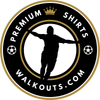Clube de Regatas do Flamengo, founded on 1895, is based in Gávea, Rio de Janeiro and competes in Campeonato Brasileiro Série A, a profile that underpins the demand for signed football shirts and memorabilia at Walkouts. The club began as a rowing club in the Flamengo neighbourhood and evolved into Brazil’s most widely supported football institution, its red and black strip recognised worldwide.
Flamengo’s football identity has been shaped by iconic venues and training bases, from the pitch of the Maracanã Stadium to the academy at Ninho do Urubu. The team’s domestic influence is reflected in multiple Campeonato Brasileiro Série A titles, while continental success is anchored by the Copa Libertadores, achievements that inform which shirts and seasons collectors chase.
The club’s production runs, supplier eras and commemorative badges also feed collector interest. IFFHS ranks Flamengo 14th in its global club table, a contextual metric often cited by enthusiasts when comparing provenance and rarity across markets. The youth academy and alumni such as Zico, Vinícius Júnior and Júlio César lend name recognition to signed retail shirts from specific eras.
Collectors prize anniversary releases and special badges. Post-1970 commemoratives such as the 2019 120-year items appear on many buyers’ lists because they mark a clear milestone and were issued in limited styles, often with alternate crest treatments and short production runs.
Season and match magnets are central to provenance. Shirts from the 1981 Libertadores and Intercontinental final era and the 2019 Libertadores campaign fetch attention because they tie to defining matches and generation-defining squads. Early retail runs, player-issue variants and region-specific fanshop editions raise desirability when tied to those fixtures.
Iconic shirts include away examples that carry decisive continental stories, specifically the white away shirt linked to the Copa Libertadores that is tied to late away wins and final appearances. Signed fanshop shirts, not only match-worn jerseys, are actively collected, with emphasis on first production runs, player-issue variants and limited regional releases, and collectors often seek documented provenance such as a COA for resale or display.
Provenance is rooted in club moments and venues, from the Maracanã stage to derby nights in Fla-Flu and crucial ties played in Guayaquil. Framed retail shirts from 1981, 2019 and the 2022 Libertadores run carry documentary value that appeals to long-term admirers and museum curators, and Walkouts lists authenticated pieces alongside clear photos and origin notes.







